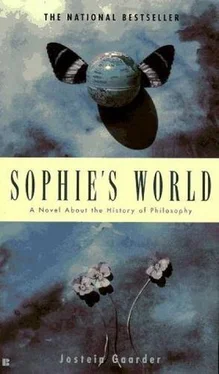Jostein Gaarder - Sophie's World - A Novel About the History of Philosophy
Здесь есть возможность читать онлайн «Jostein Gaarder - Sophie's World - A Novel About the History of Philosophy» весь текст электронной книги совершенно бесплатно (целиком полную версию без сокращений). В некоторых случаях можно слушать аудио, скачать через торрент в формате fb2 и присутствует краткое содержание. ISBN: , Издательство: BERKLEY BOOKS, NEW YORK, Жанр: Философия, на английском языке. Описание произведения, (предисловие) а так же отзывы посетителей доступны на портале библиотеки ЛибКат.
- Название:Sophie's World: A Novel About the History of Philosophy
- Автор:
- Издательство:BERKLEY BOOKS, NEW YORK
- Жанр:
- Год:неизвестен
- ISBN:0-425-15225-1
- Рейтинг книги:4 / 5. Голосов: 1
-
Избранное:Добавить в избранное
- Отзывы:
-
Ваша оценка:
- 80
- 1
- 2
- 3
- 4
- 5
Sophie's World: A Novel About the History of Philosophy: краткое содержание, описание и аннотация
Предлагаем к чтению аннотацию, описание, краткое содержание или предисловие (зависит от того, что написал сам автор книги «Sophie's World: A Novel About the History of Philosophy»). Если вы не нашли необходимую информацию о книге — напишите в комментариях, мы постараемся отыскать её.
Sophie's World: A Novel About the History of Philosophy — читать онлайн бесплатно полную книгу (весь текст) целиком
Ниже представлен текст книги, разбитый по страницам. Система сохранения места последней прочитанной страницы, позволяет с удобством читать онлайн бесплатно книгу «Sophie's World: A Novel About the History of Philosophy», без необходимости каждый раз заново искать на чём Вы остановились. Поставьте закладку, и сможете в любой момент перейти на страницу, на которой закончили чтение.
Интервал:
Закладка:
“Go on.”
“The key word in Sartre’s philosophy, as in Kierkegaard’s, is ‘existence.’ But existence did not mean the same as being alive. Plants and animals are also alive, they exist, but they do not have to think about what it implies. Man is the only living creature that is conscious of its own existence. Sartre said that a material thing is simply ‘in itself,’ but mankind is ‘for itself.’ The being of man is therefore not the same as the being of things.”
“I can’t disagree with that.”
“Sartre said that man’s existence takes priority over whatever he might otherwise be. The fact that I exist takes priority over what I am. ‘Existence takes priority over essence.’ “
“That was a very complicated statement.”
“By essence we mean that which something consists of—the nature, or being, of something. But according to Sartre, man has no such innate ‘nature.’ Man must therefore create himself. He must create his own nature or ‘essence,’ because it is not fixed in advance.”
“I think I see what you mean.”
“Throughout the entire history of philosophy, philosophers have sought to discover what man is—or what human nature is. But Sartre believed that man has no such eternal ‘nature’ to fall back on. It is therefore useless to search for the meaning of life in general. We are condemned to improvise. We are like actors dragged onto the stage without having learned our lines, with no script and no prompter to whisper stage directions to us. We must decide for ourselves how to live.”
“That’s true, actually. If one could just look in the Bible—or in a philosophy book—to find out how to live, it would be very practical.”
“You’ve got the point. When people realize they are alive and will one day die—and there is no meaning to cling to—they experience angst, said Sartre. You may recall that angst, a sense of dread, was also characteristic of Kierkegaard’s description of a person in an existential situation.”
“Yes.”
“Sartre says that man feels a//en in a world without meaning. When he describes man’s ‘alienation,’ he is echoing the central ideas of Hegel and Marx. Man’s feeling of alienation in the world creates a sense of despair, boredom, nausea, and absurdity.”
“It is quite normal to feel depressed, or to feel that everything is just too boring.”
“Yes, indeed. Sartre was describing the twentieth-century city dweller. You remember that the Renaissance humanists had drawn attention, almost triumphantly, to man’s freedom and independence? Sartre experienced man’s freedom as a curse. ‘Man is condemned to be free,’ he said. ‘Condemned because he has not created himself—and is nevertheless free. Because having once been hurled into the world, he is responsible for everything he does.’ “
“But we haven’t asked to be created as free individuals.”
“That was precisely Sartre’s point. Nevertheless we are free individuals, and this freedom condemns us to make choices throughout our lives. There are no eternal values or norms we can adhere to, which makes our choices even more significant. Because we are totally responsible for everything we do. Sartre emphasized that man must never disclaim the responsibility for his actions. Nor can we avoid the responsibility of making our own choices on the grounds that we ‘must’ go to work, or we ‘must’ live up to certain middle-class expectations regarding how we should live. Those who thus slip into the anonymous masses will never be other than members of the impersonal flock, having fled from themselves into self-deception. On the other hand our freedom obliges us to make something of ourselves, to live ‘authentically’ or ‘truly.’ “
“Yes, I see.”
“This is not least the case as regards our ethical choices. We can never lay the blame on ‘human nature,’ or ‘human frailty’ or anything like that. Now and then it happens that grown men behave like pigs and then blame it on ‘the old Adam.’ But there is no ‘old Adam.’ He is merely a figure we clutch at to avoid taking responsibility for our own actions.”
“There ought to be a limit to what man can be blamed for.”
“Although Sartre claimed there was no innate meaning to life, he did not mean that nothing mattered. He was not what we call a nihilist.”
“What is that?”
“That is a person who thinks nothing means anything and everything is permissible. Sartre believed that life must have meaning. It is an imperative. But it is we ourselves who must create this meaning in our own lives. To exist is to create your own life.”
“Could you elaborate on that?” /
“Sartre tried to prove that consciousness in itself is nothing until it has perceived something. Because consciousness is always conscious of something. And this ‘something’ is provided just as much by ourselves as by our surroundings. We are partly instrumental in deciding what we perceive by selecting what is significant for us.”
“Could you give me an example?”
“Two people can be present in the same room and yet experience it quite differently. This is because we contribute our own meaning—or our own interests—when we perceive our surroundings. A woman who is pregnant might think she sees other pregnant women everywhere she looks. That is not because there were no pregnant women before, but because now that she is pregnant she sees the world through different eyes. An escaped convict may see policemen everywhere ...”
“Mm, I see.”
“Our own lives influence the way we perceive things in the room. If something is of no interest to me, I don’t see it. So now I can perhaps explain why I was late today.”
“It was on purpose, right?”
“Tell me first of all what you saw when you came in here.”
“The first thing I saw was that you weren’t here.”
“Isn’t it strange that the first thing you noticed was something that was absent?”
“Maybe, but it was you I was supposed to meet.”
“Sartre uses just such a cafe visit to demonstrate the way we ‘annihilate’ whatever is irrelevant for us.”
“You got here late just to demonstrate that?”
“To enable you to understand this central point in Sartre’s philosophy, yes. Call it an exercise.”
“Get out of here!”
“If you were in love, and were waiting for your loved one to call you, you might ‘hear’ him not calling you all evening. You arrange to meet him at the train; crowds of people are milling about on the platform and you can’t see him anywhere. They are all in the way, they are unimportant to you. You might find them aggravating, unpleasant even. They are taking up far too much room. The only thing you register is that he is not there.”
“How sad.”
“Simone de Beauvoir attempted to apply existentialism to feminism. Sartre had already said that man has no basic ‘nature’ to fall back on. We create ourselves.”
“Really?”
“This is also true of the way we perceive the sexes. Simone de Beauvoir denied the existence of a basic ‘female nature’ or ‘male nature.’ For instance, it has been generally claimed that man has a ‘transcending,’ or achieving, nature. He will therefore seek meaning and direction outside the home. Woman has been said to have the opposite life philosophy. She is ‘immanent,’ which means she wishes to be where she is. She will therefore nurture her family, care for the environment and more homely things. Nowadays we might say that women are more concerned with ‘feminine values’ than men.”
“Did she really believe that?”
“You weren’t listening to me. Simone de Beauvoir in fact did not believe in the existence of any such ‘female nature’ or ‘male nature.’ On the contrary, she believed that women and men must liberate themselves from such ingrown prejudices or ideals.”
Читать дальшеИнтервал:
Закладка:
Похожие книги на «Sophie's World: A Novel About the History of Philosophy»
Представляем Вашему вниманию похожие книги на «Sophie's World: A Novel About the History of Philosophy» списком для выбора. Мы отобрали схожую по названию и смыслу литературу в надежде предоставить читателям больше вариантов отыскать новые, интересные, ещё непрочитанные произведения.
Обсуждение, отзывы о книге «Sophie's World: A Novel About the History of Philosophy» и просто собственные мнения читателей. Оставьте ваши комментарии, напишите, что Вы думаете о произведении, его смысле или главных героях. Укажите что конкретно понравилось, а что нет, и почему Вы так считаете.












